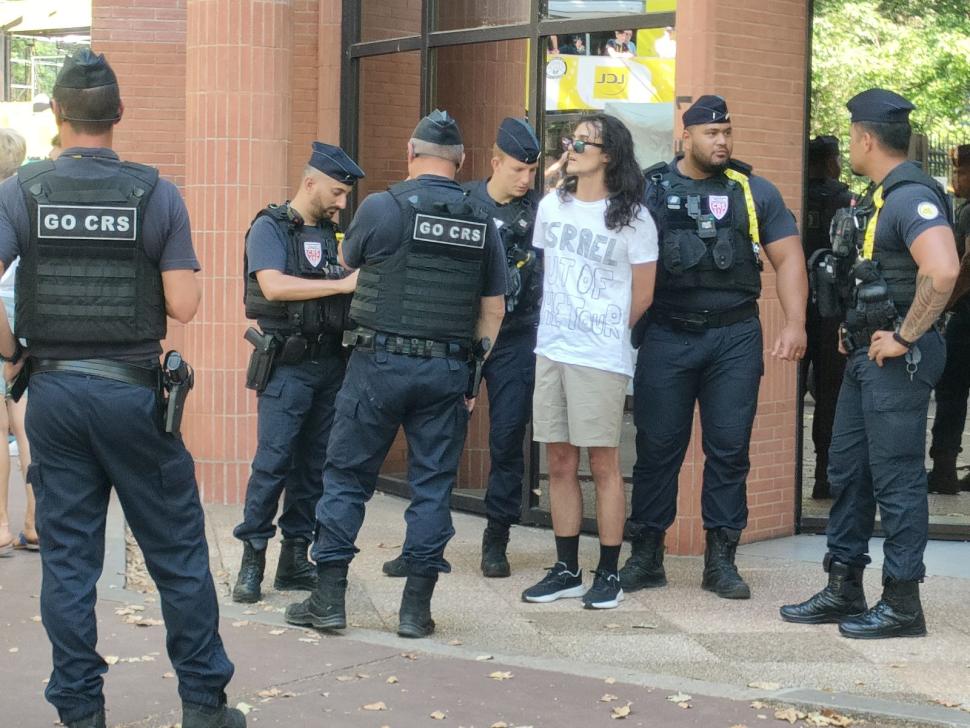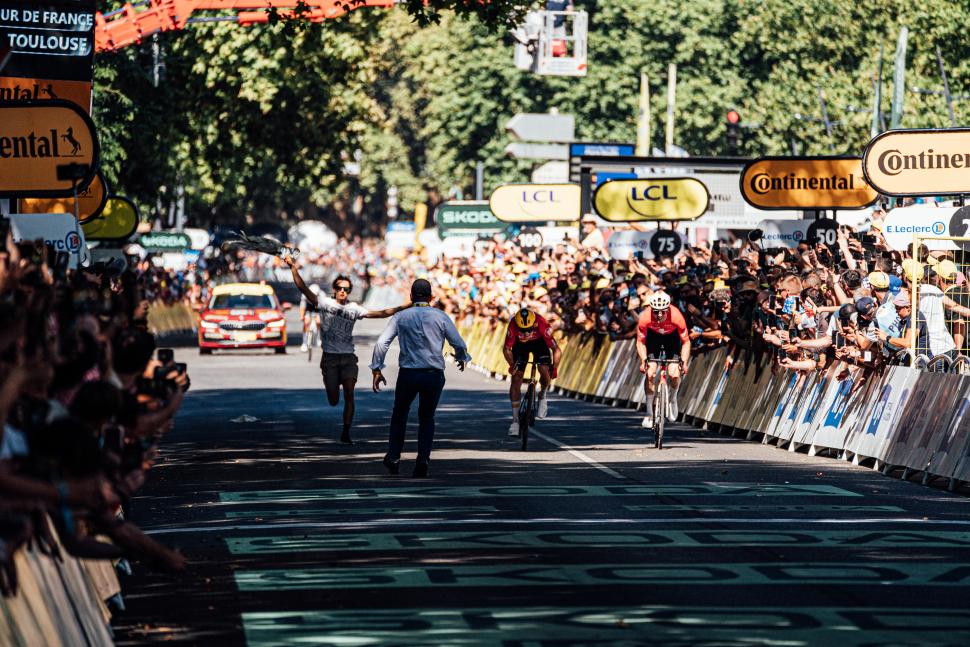Two-time Critérium du Dauphiné winner Jakob Fuglsang has admitted that he feels a sense of relief at no longer wearing the Israel-Premier Tech jersey, as the 40-year-old Dane reflected on his retirement from pro cycling by saying it is “definitely nicer to ride without an Israel logo than with it.”
Speaking to Danish outlet Feltet after the Frederiksberg Criterium, his final professional race on Sunday, Fuglsang said: “Of course, it’s nicer to be without. I don’t want to get myself involved in what’s happening politically, but it’s definitely nicer to ride around without an Israel logo than with an Israel logo.”
The former Astana leader, whose decorated palmarès includes the 2019 Liège-Bastogne-Liège and 2020 Il Lombardia, added that protests targeting Israel-Premier Tech at major races had not directly affected him.
“I actually didn’t experience that. With or without Israel-Premier Tech at the start, there probably still would have been demonstrations. You also see climate protests during the Tour de France. These are big events with a lot of media attention. That said, it’s better to ride without [the logo].”
Fuglsang announced his retirement after riding the Giro d’Italia in June after a string of successful years in the peloton, which besides the two monuments and the two Dauphiné titles, have also included a stage win at Vuelta a España, GC wins at Tour of Denmark and Vuelta a Andalucía, and a silver medal at the 2016 Rio Olympics.
Jakob Fuglsang, 2019 Criterium du Dauphine.JPG (credit: Zac Williams/SWpix.com)
He was recently praised by Danish legend and former Tour de France champion Bjarne Riis, who told Ekstra Bladet: “Jakob is without a doubt very high on the list of Denmark’s greatest riders. We’re saying goodbye to a truly outstanding rider. He’s been consistent over many years and delivered some major results.”
More praise came from Mads Pedersen before the final stage of Tour of Denmark, where Fuglsang officially bowed out of pro cycling earlier this month with a brave breakaway ride, as the Dane said: “I think we can all agree that Jakob is one of the greatest Danish riders we’ve ever had.”
Fuglsang’s comments follow those of former teammate Alessandro De Marchi, who just weeks ago said that he was “happy and relieved” not to represent Israel-Premier Tech and argued that it was “better to follow your morals.”
“We need to see real action from our governing body to position the cycling world on the right side and to show awareness of what’s going on in Gaza,” De Marchi, who’s also retiring at the end of this season, told The Observer. “We have to show that as a cycling world we care about human rights and international law violations.”
De Marchi’s interview came in the aftermath of a protest at the Tour de France, when an Extinction Rebellion activist stormed the finish straight of stage eleven in Toulouse wearing a T-shirt emblazoned with the slogans “Israel out of the Tour,” “Stop Genocide,” and “Free Gaza.”
The demonstrator, waving Palestinian flags and wearing a keffiyeh, was tackled into the barriers by organisers just as Jonas Abrahamsen and Mauro Schmid sprinted for the line. A woman in the crowd was also seriously injured in the incident.
 Tour de France stage 11 protester (credit: Ryan Mallon)
Tour de France stage 11 protester (credit: Ryan Mallon)
XR Toulouse claimed the action was carried out “to denounce Tour de France’s complicity in the genocide” and accused the race of “helping restore the image of the Israeli colonial regime” by allowing IPT to participate. The group declared: “Neutrality does not exist. Not acting in a situation of oppression is like taking the side of the oppressor.”
Israel-Premier Tech responded at the time by saying it “respects everyone’s right to free speech” but “absolutely condemns any protests or actions of individuals that interfere with racing at the Tour de France or threaten the safety of the peloton.”
While the Tour de France protest marked the most high-profile incident of its kind, it was by no means the first. At the Giro d’Italia in Naples, pro-Palestine activists ran into the road in front of a charging peloton.
At the 2024 Tour of Britain, campaigners confronted team staff at multiple stages, accusing the squad of “sportswashing” Israel’s reputation. Protests were also seen at the Tour Down Under in Australia.
 Anti-Israel protester runs onto road during sprint finish, 2025 Tour de France, stage 11, Toulouse (credit: Zac Williams/SWpix.com)
Anti-Israel protester runs onto road during sprint finish, 2025 Tour de France, stage 11, Toulouse (credit: Zac Williams/SWpix.com)
The team itself quietly removed the word “Israel” from its vehicles and training kit in March 2024, replacing it with a monogram of the Star of David and “PT” logo, though it insisted it continued to “race proudly as Israel-Premier Tech.”
Criticism has also often focused on Sylvan Adams, the Canadian-Israeli billionaire who co-owns the team. Adams has long described IPT as “ambassadors” for Israel and has invested millions in sports events, including the 2018 Giro d’Italia Grande Partenza from Jerusalem.
Adams has also faced condemnation for remarks to Israeli media in which he said the Israel Defence Force “needs to finish the job” in Gaza and to “mop up,” comments widely criticised by campaigners as showing disregard for civilian suffering.
 Pro-Palestine protesters at Tour of Britain Sept 2024 (Scottish Palestine Solidarity Campaign) (credit: road.cc)
Pro-Palestine protesters at Tour of Britain Sept 2024 (Scottish Palestine Solidarity Campaign) (credit: road.cc)
Critics of IPT have argued that its presence in cycling is starkly at odds with the destruction of Palestinian sport. Two weeks ago, the Guardian reported that Suleiman al-Obeid, the “Palestinian Pelé,” was killed by Israeli forces while waiting for humanitarian aid in southern Gaza. The Palestine Football Association said at least 662 sportspeople and relatives had been killed since the Israeli attacks began, including 421 footballers, and that 288 sports facilities had been destroyed.
Last month, Israel’s own B’Tselem and Physicians for Human Rights-Israel said the assault in Gaza amounted to genocide, citing the targeting of civilians “only because of their identity as Palestinians,” mass forced displacement, starvation and the destruction of essential infrastructure. Amnesty International, Médecins Sans Frontières and UN-appointed experts have reached similar conclusions.
In April, the Boycott, Divestment and Sanctions (BDS) Movement accused cycling’s governing body, the UCI, of “helping to sportswash Israel’s Gaza genocide by allowing Israel Premier Tech to participate,” contrasting its response to Russia’s invasion of Ukraine with what it called “Western hypocrisy.” It urged protesters to mobilise at the Giro, Tour and Vuelta against what it described as “Team Genocide.”

